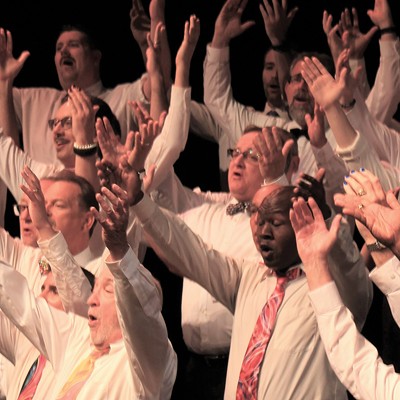Theater is a wonderful, remarkable scam.
"Scam" may seem like a strong word, but think about it: We pay good money to open our minds and hearts to apparently benign strangers who assume identities to tell a story that we know is not factually true—but we also know the story has the potential to deliver more truth than we ever recognize in the events of our real lives.
Sometimes, as in most scams, we get much more than we signed on for, often in ways not so pleasurable.
Good theaters promise to engage us, to entertain us, to give our heads a bit of a spin. And the Rogue Theatre delivers big-time in Shipwrecked! An Entertainment: The Amazing Adventures of Louis de Rougemont (As Told by Himself). It's a tale told with charmingly transparent theatricality, which makes this whole theater scam/convention thing even more intriguing. Not only do we give ourselves over to a total fiction; we also delight in observing the tricks of the trade—the bells and whistles (quite literally, in this case) that help create the experience.
Shipwrecked is a fantastical tale told in a fantastical fashion. We are introduced to Louis (David Morden), a likable chap who savors the wild adventures that have been the substance of his life, and insists with great glee and generosity that he share these adventures with us.
Donald Margulies' play has the feel and appeal of a children's theater piece: It's exuberant, energetic and full of invention, with silly pieces of this and that which suggest costumes and multiple roles assumed by a handful of actors.
Louis' overly protective mother reads her sickly child adventure stories in which his imagination takes him beyond the confines of his frail body and the walls that separate him from the world outside. When he feels the kiss of the sun on his cheeks for the first time, he knows he is destined to experience the world in ways that only those who allow themselves to welcome it with wide-open enthusiasm can.
He meets a ship's captain and becomes part of the crew sailing to the Coral Sea to harvest pearls, a magically successful enterprise which comes apart at the seams as the ship, the Wonderworld, becomes victim to the unruly seas. Louis finds himself on a deserted island. His only companion is Bruno, the lost captain's mutt who has pulled Louis to safety and becomes his steadfast friend and confidante. Louis' ever-adventurous trek through his years involves rescuing an Aboriginal family from a drifting raft; a happy sojourn with the natives, including raising a family and becoming something of a deity; and a desire to return to his native England and his mother.
Thanks to some imagination on our part, and the skilled inventions of a few talented Rogue players, we experience it all.
Director Cynthia Meier and her ensemble take a simple set—really, just a platform—and magically move us smack-dab inside Louis' story. Sound effects are a critical part of the tale-telling, as is the music that Dawn C. Sellers, the musical director, has chosen and performs.
Morden as Louis is a delightful storyteller—a bit inflated, perhaps, but captivating and sympathetic. Morden gives himself over to Louis as fully as Louis invests himself in his own story. He executes a hugely demanding role with skill and heart.
But the story really couldn't be told without the supporting players. Angela Dawnielle Horchem and Matt Walley contribute solidly. But it's Patty Gallagher and Joseph McGrath who are asked to give, and give some more, to effectively endear us to every character they are required to portray. With a sound, a look and a few choice words, Louis' story unfolds capably in their hands. Finding a small trait that will suggest an entire character, and then delivering it convincingly and with good humor, is not an easy job. Gallagher's physical skills lend a wonderful dimension to her work, and McGrath's understated approach to his portrayal of Bruno the dog is an absolute delight.
If you are familiar with the Rogue and its brand of theater, you might be wondering: an adventure story suitable for children? What's up with that? Where's the heft, the weight, the gravitas that is so much a part of the Rogue's identity? Oh, sure, the Rogue is capable of great humor and a comic touch, but a simply envisioned adventure story?
Yes, Rogue fans, this boisterous adventure story does take a turn. It wouldn't be fair to detail the twisting path here; it is more than just a tease or a gratuitous surprise, although it might be argued that it suffers from a lack of plausibility.
It does, however, make us think about the nature of storytelling, even theatrical storytelling, and the nature of truth itself. In the first line of The White Album, writer Joan Didion states, "We tell ourselves stories in order to live." How our stories help us make sense of our lives—and how they help our fellow travelers make sense of their own—can sometimes have questionable, perhaps even dangerous, consequences. Should we let facts constitute reality? Or can we discover more truth in the stories we tell ourselves, individually and collectively, than in facts, which, in an attempt to help define reality, often actually limit it?
Theater is a delightful scam—OK, convention—in which we collectively agree that truth trumps facts. Outside of the theater, we somehow collectively agree on what is real, in the presence of facts or not. Can the same be true for the individual? Are facts too often the enemy of truth? Good question. And it runs between the lines of the Rogue's inventive and entertaining Shipwrecked!








